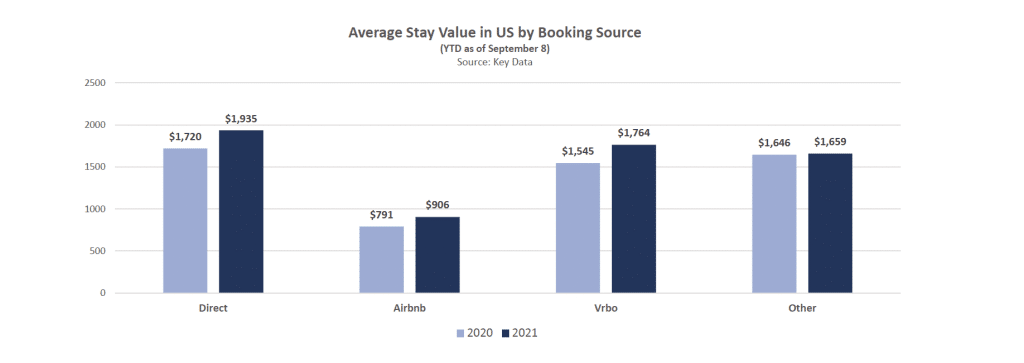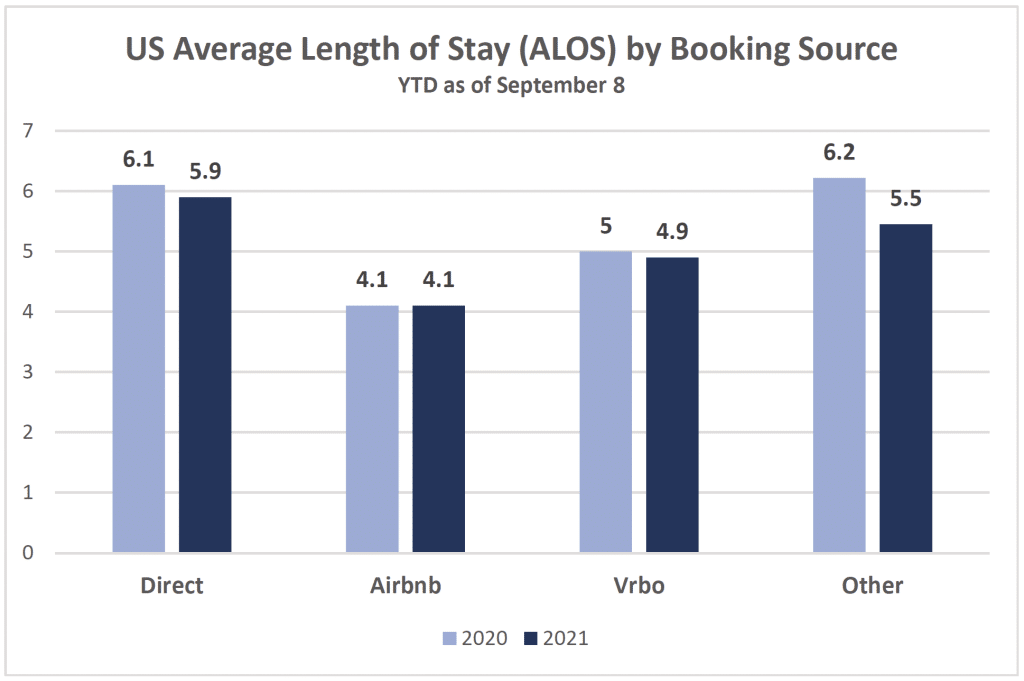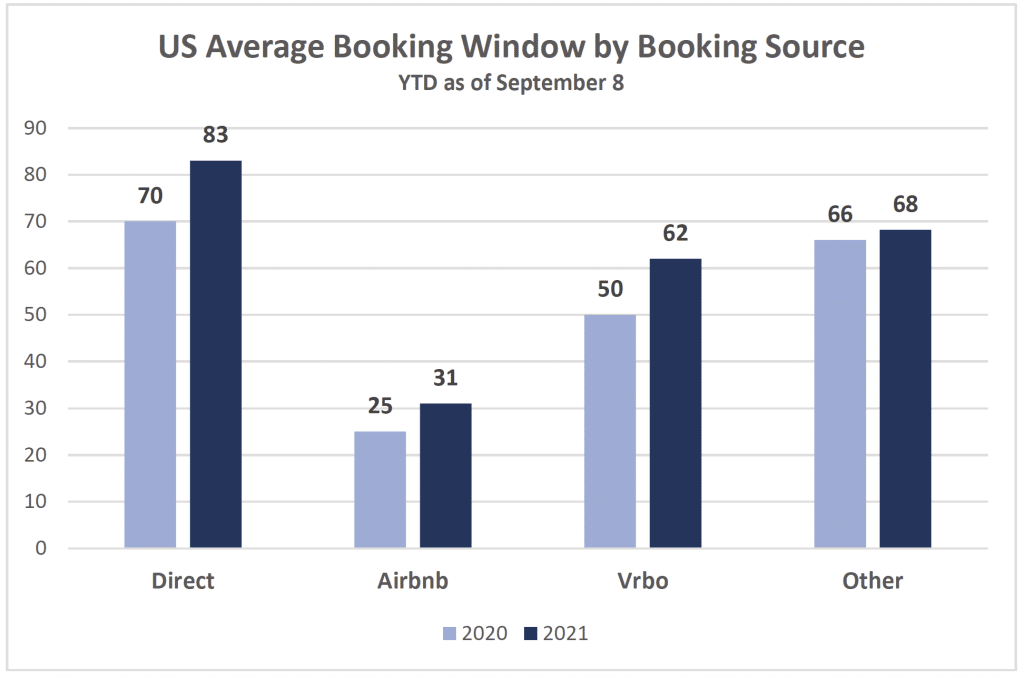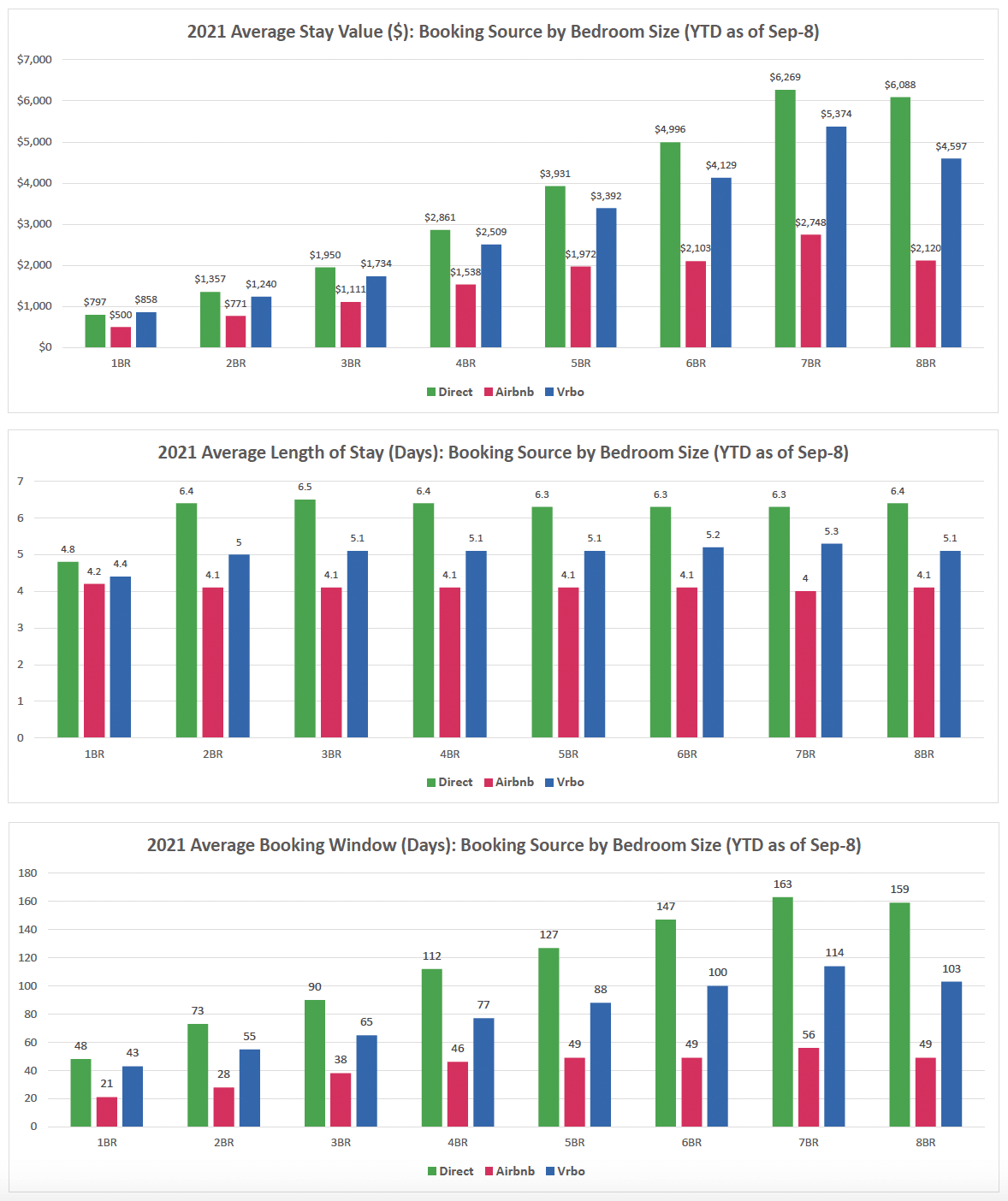Airbnb For Bookings Even More Risky with New Refund Policy
Yesterday Airbnb announced a change to its refund policy that has the potential to be disruptive for professional vacation rental managers and homeowners, aka “hosts.” Airbnb’s new policy goes into effect for stays made on or after April 29, 2022, and defines “how we will assist with rebooking a reservation and how we handle refunds when a Host cancels a reservation or another Travel Issue disrupts a stay.”
In addition to loosening language around what constitutes a Travel Issue, the new policy states: “Where Airbnb incurs costs in assisting a guest with finding or booking comparable or better accommodations, the Host will be responsible for, and Airbnb will have the right to require the Host to pay or otherwise reimburse, those costs in addition to the amount of any refund.”
KLEENEX®, POST-IT®, UBER, AND AIRBNB
There’s a lot to unpack with the policy change, but let’s take a critical moment to consider Airbnb’s brand through the eyes of the consumer. It is fascinating when the general public makes an unconscious, collective decision to call a product or service by a brand name. As the vacation rental industry stood on the sidelines watching consumers label private-home rentals as “Airbnbs,” comparisons frequently were drawn to Kleenex®, Post-it®, and Uber to make sense of the phenomenon. However, these comparisons are misleading to the public.
Kleenex® and Post-its® are products which are owned, standardized, produced, distributed, and quality controlled; and, even though Uber contracts with drivers who own and service their vehicles, Uber Technologies ultimately controls and is responsible for its service. The company has standards, vetting, processes, and accountability for its drivers’ actions when servicing Uber’s customers.
In contrast, Airbnb is a website that lists short-term rentals and doesn’t own, manage, service, or control any of the rental properties listed on its website. And listing is fast and easy. According to CEO Brian Chesky, “We’re going to allow you to become a host in less than 10 minutes.”
Instead of Kleenex®, Post-its®, and Uber, Airbnb is more like Amazon’s retail arm. Both models require building significant trust with the public. Since neither company controls the product(s) it sells, both use a primary tool to garner trust with consumers: easy refunds.
AIRBNB WAS ALREADY RISKY
On March 11, 2020, Airbnb infamously used its Extenuating Circumstances policy to override its hosts’ cancellation policies and issue blanket refunds for any stay within the following 45 days. However, vacation rental managers have long been reporting (before and after March 2020) that Airbnb’s customer service representative are quick to take the side of the guest over the host and refund for any issues that arise during a stay, regardless how minor or unsubstantiated these issues may be.
In addition to refunding, Airbnb rewards hosts with the most flexible cancellation policies. However, for vacation rentals with an average booking window of 80+ days, for example, a 48-hour cancelation policy equals lost revenue. According to industry expert Amber Carpenter, “If you dig even deeper you will figure out that Airbnb is hard at work to update its search results algorithms and consumer-facing search filters to promote properties with the most flexible cancellation policies, which is great for guests but really hard for homeowners and property managers who cannot replace the lost revenue with 24 hours’ notice like an urban hotel.”
Beyond refunds and cancellations, property managers have reported multiple problems from Airbnb guests, including squatters and guests who rent homes for large parties causing damage to the home and problems with neighbors.
AIRBNB’S NEW REFUND AND REIMBURSEMENT POLICY FOR “TRAVEL ISSUES”
Yesterday’s policy announcement affirms that Airbnb intends to continue buying consumer trust with refunds.
And why not? Airbnb isn’t refunding its own money. It isn’t refunding the booking fee it collects. The cost of this trust is born on the backs of its host community.
There are three noteworthy changes to the refund policy. First, guests are able to request a refund 72 hours after a Travel Issue is discovered instead of 24 hours, and in some cases, they can report more than 72 hours after the issue is found. Second, the language defining a Travel Issue is more ambiguous. Third, hosts may be required to pay for “comparable or better accommodations” for guests who have a Travel Issue.
1. 72 Hours
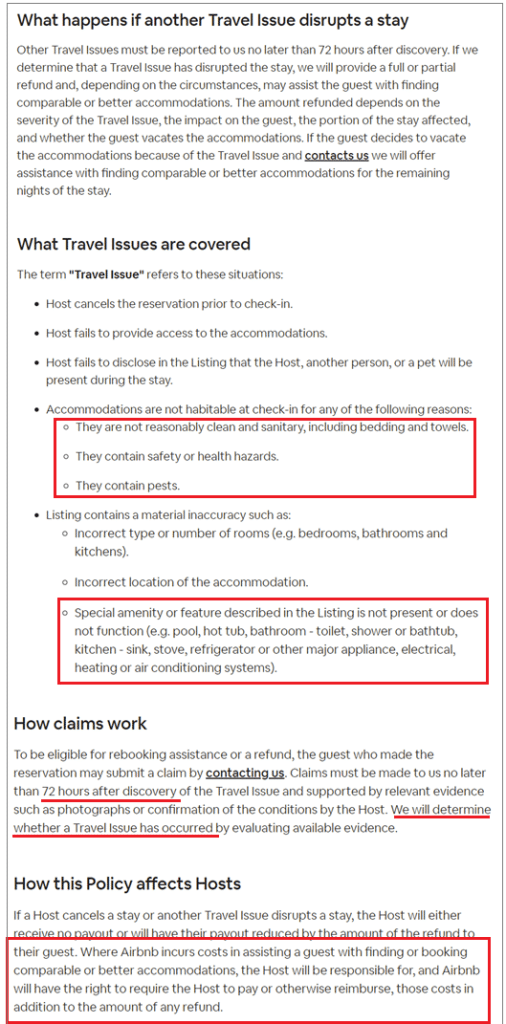
The previous policy stated that guests had 24 hours after discovery to report a Travel Issue to Airbnb and request a refund.
2. Travel Issues Concerning the Condition of the Property
With a historically subjective refund policy, property managers were hoping Airbnb would be clearer and stricter in specifying the parameters and kinds of issues that would entitle guests to a refund. Instead, the language remains ambiguous, and in some cases, even more so.
The previous policy said, “at the start of the Guest’s booking, the Accommodation: (i) is not generally clean and sanitary (including unclean bedding and/or bathroom towels); (ii) contains safety or health hazards that would be reasonably expected to adversely affect the Guest’s stay at the Accommodation in Airbnb’s judgment, or (iii) has vermin or contains pets not disclosed in the Listing.”
The screenshot on the right is from the new policy. As you can see, language about safety was changed from “safety or health hazards that would be reasonably expected to adversely affect the Guest’s stay” to “They contain safety or health hazards.”
In addition, the term “vermin” was changed to “pests,” and “generally clean” was changed to “reasonably clean.”
While subtle, the changes give Airbnb even more leeway in issuing refunds.
3. Airbnb can now require hosts to pay or reimburse for “comparable or better accommodations.”
The new policy added a new component to its refund policy: “Where Airbnb incurs costs in assisting a guest with finding or booking comparable or better accommodations, the Host will be responsible for, and Airbnb will have the right to require the Host to pay or otherwise reimburse, those costs in addition to the amount of any refund.”
Consider a hypothetical situation in which a guest books a 6-bedroom beachfront home during the week of July 4th for their group. A couple of days after check-in, they find ants in the kitchen. They call Airbnb to say they want to be moved. Airbnb decides to refund the guest and move them to the only unoccupied 6+ bedroom home on the beach which is now 3x the rate they paid. Will Airbnb charge the host for the cost of that home in addition to refunding the unused—and now unbookable—nights?
AIRBNB’S AVERAGE STAY VALUE, AVERAGE LENGTH OF STAY, AND AVERAGE BOOKING WINDOW IS BELOW OTHER CHANNELS
In addition to increased risk for bookings on Airbnb, compared to direct bookings, the average stay value (ASV) was 53 percent lower, the average length of stay was 31 percent smaller, and the average booking window was a 63 percent shorter for bookings on Airbnb (see charts below).
Moreover, Airbnb’s guests book more last minute than guests booking on Vrbo or directly with property managers. The gap becomes more pronounced as the number of bedrooms increases. For example, for homes with 7-8 bedrooms, the booking window is 66–69 percent shorter on Airbnb than on direct channels and over 50 percent shorter than on Vrbo (see charts below).
BUYING TRUST WITH REFUNDS
Thinking back to the comparison between Airbnb and Amazon’s retail business, both companies are built on being consumer-friendly and trustworthy marketplaces. Trust is the foundation of the model. Airbnb is following Amazon’s lead by leaning heavily on refunds in order to secure this trust. The difference is that Amazon’s retail suppliers sell widgets. In contrast, when Airbnb issues a refund for a 7-night stay, the individual host loses 2% to 14% of their annual revenue (based on average occupancy rates across destinations). If the host then must pay additionally for “comparable or better accommodations” for the guest, the loss is untenable.
As fiduciaries, professional vacation rental managers have a responsibility to their homeowners to manage risk—risk to the home and risk to the revenue. When evaluating future distribution strategies, risk management is going to play a more significant role in determining success.
If Airbnb’s strategy is to gain consumer trust by refunding its suppliers’ revenue, it will start to see its high-quality supply move elsewhere.
